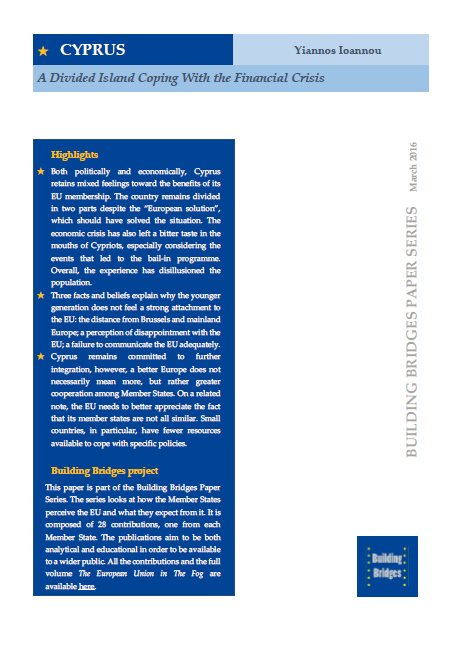Cyprus: A Divided Island Coping with the Financial Crisis

Both politically and economically, Cyprus retains mixed feelings toward the benefits of its EU membership. The country remains divided in two parts despite the “European solution”, which should have solved the situation. The economic crisis has also left a bitter taste in the mouths of Cypriots, especially considering the events that led to the bail-in programme. Overall, the experience has disillusioned the population.
Three facts and beliefs explain why the younger generation does not feel a strong attachment to the EU: the distance from Brussels and mainland Europe; a perception of disappointment with the EU; a failure to communicate the EU adequately.
Cyprus remains committed to further integration, however, a better Europe does not necessarily mean more, but rather greater cooperation among Member States. On a related note, the EU needs to better appreciate the fact that its Member States are not all similar. Small countries, in particular, have fewer resources available to cope with specific policies.

Available in:
Regions and themes
Share
Download the full analysis
This page contains only a summary of our work. If you would like to have access to all the information from our research on the subject, you can download the full version in PDF format.
Cyprus: A Divided Island Coping with the Financial Crisis
Related centers and programs
Discover our other research centers and programsFind out more
Discover all our analysesThe U.S. Policy Toward Taiwan Beyond Donald Trump: Mapping the American Stakeholders of U.S.-Taiwan Relations
Donald Trump’s return to the White House reintroduced acute uncertainty into the security commitment of the United States (U.S.) to Taiwan. Unlike President Joe Biden, who repeatedly stated the determination to defend Taiwan, President Trump refrains from commenting on the hypothetical U.S. response in the context of a cross-Strait crisis.

China’s Strategy Toward Pacific Island countries: Countering Taiwan and Western Influence
Over the past decade, China has deployed a diplomatic strategy toward the Pacific Island Countries (PICs). This strategy pursues two main objectives: countering Taiwan's diplomatic influence in the region and countering the influence of liberal democracies in what Beijing refers to as the "Global South."

Opening up the G7 to South Korea to Address Contemporary Global Challenges
The G7’s global influence has diminished as powers like China reshape international governance through initiatives such as BRICS and the Shanghai Cooperation Organisation (SCO). With the G7 now representing just 10 per cent of the world’s population and 28 per cent of global GDP, its relevance is increasingly questioned.
Expanding SPDMM as a pivotal institution in the Pacific – A French perspective
The South Pacific Defence Ministers’ Meeting (SPDMM) is the only forum that brings together defense ministers from the wider South Pacific — including Chile, which is hosting it for the first time. This heterogeneous group of countries with varying resources, capacities, and interests — Australia, Chile, Fiji, France, New Zealand, Papua New Guinea (PNG), and Tonga — are united by their shared determination to strengthen cooperation on maritime security and humanitarian assistance and disaster relief (HADR) activities.







